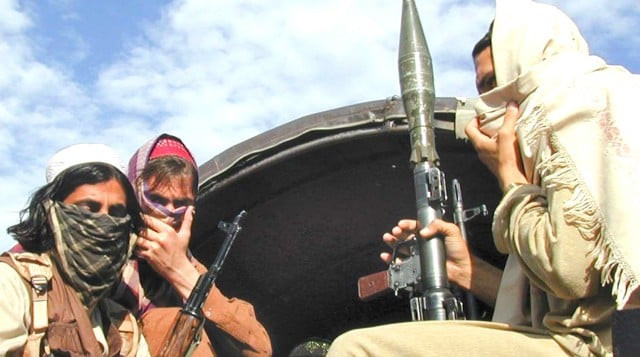Government opens peace talks with local Taliban
Al Qaeda will have no role in negotiations, authorities tell the Taliban unequivocally.

Pakistan has started peace talks with the Tehreek-i-Taliban Pakistan (TTP), and other militant groups across the Federally Administered Tribal Areas (Fata), in anticipation of early withdrawal of Nato troops from Afghanistan, informed sources told The Express Tribune.
The move is a critical step in transition to full Afghan control by the end of 2014, announced by US President Obama at a Nato summit in Lisbon last year.
The initial talks were opened up with the TTP, and its affiliated militants, prior to the recent wave of terrorist attacks across Pakistan, sources said.
“Both sides, at the moment, are putting up their respective demands and their terms and conditions to bring an end to militancy in Fata and other regions of Khyber-Pakhtunkhwa,” sources added.
The authorities, however, have made it clear to the TTP and others that no role of al Qaeda is to be accepted at any level in these negotiations, sources said, adding that “some tribal elders from Pakistani territory are mediating between security high-ups and leaders of the TTP and other militant outfits.”
Abandoning the lashkars
Before opening these talks, the authorities had withdrawn their support to the anti-Taliban militias, commonly known as the ‘Qaumi Amn Lashkar’ in different parts of Fata, leaving them at the mercy of TTP and other militant groups.
The situation encouraged Taliban to settle their scores with these lashkars through attacks such as the one at a funeral gathering in Adezai area near Peshawar on March 9. The attack claimed 44 lives.
The attack prompted head of Qaumi Lashkar Haji Dilawar Khan to warn the government that his men would be forced to seek other alternatives if due material and financial support from the government is not extended within two days. The government chose to ignore their demands.
Meanwhile, senior minister K-P Bashir Bilour reportedly told the media that militias were no longer useful but added that the government would hold talks with lashkar leaders soon regarding the threats they face from the Taliban, for siding with the government.
Walking tight rope
The government, however, wishes to antagonise neither the militants, nor the lashkars, to keep its options open, sources explained.
The K-P government, therefore, paid financial compensation to the families of victims of the suicide attack but refused to extend material help to the lashkars.
It did not wish to annoy the Taliban by openly supporting their ‘enemies’ nor did it want to lose support of the lashkars to maintain pressure on the Taliban, sources added.
Official condemnation
The official protest by the Chief of Army Staff against the killing of 44 members of a peace jirga in Datta Khel, North Waziristan by an American drone attack last Thursday was an indication that the government does not want to derail the peace process with the Taliban, sources told The Express Tribune.
Strongly condemning the drone attack, the Federal Minister for States and Frontier Regions Engineer Shaukatullah demanded a formal apology from Washington besides financial compensation to the victims’ families.
The incessant drone attacks are increasing chances of reprisals from the tribes and the US therefore must cease drone attacks with immediate effect, he said.
Shaukatullah, who hails from the tribal region of Bajaur himself, said the policy of targeting innocent civilians will boomerang and the peaceful citizens who lose their loved ones may turn into extremists out of sheer desperation.
It is the first time a federal minister has asked the US for a formal apology over drone attacks and financial compensation for the victims’ families.
Afghan pullout prompts talks
The Nato decision to begin its troop pullout from Afghanistan has prompted Islamabad to arrive at a negotiated settlement with the Taliban and other militants in Fata, an official source told The Express Tribune.
Nato defence ministers endorsed a plan earlier this week to hand over responsibility for security in three cities, two provinces and much of the capital Kabul, to Afghan forces over the next several months, commencing the critical first step in a transition to full Afghan control by the end of 2014.
US Defence Secretary Robert Gates urged other members of the alliance not to use the milestone as a reason to withdraw their forces, rebuking them for focusing too much on their departure from the war-torn nation instead of displaying “unity and commitment.”
“Frankly, there is too much talk about leaving and not enough talk about getting the job done right,” Gates said at the Nato headquarters in Brussels.
Published in The Express Tribune, March 21st, 2011.



















COMMENTS
Comments are moderated and generally will be posted if they are on-topic and not abusive.
For more information, please see our Comments FAQ